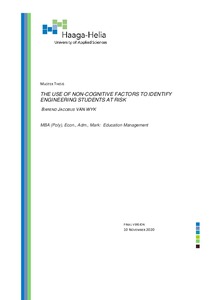The use of non-cognitive factors to identify engineering students at risk
Van Wyk, Barend Jacobus (2020)
Lataukset:
Van Wyk, Barend Jacobus
2020
All rights reserved. This publication is copyrighted. You may download, display and print it for Your own personal use. Commercial use is prohibited.
Julkaisun pysyvä osoite on
https://urn.fi/URN:NBN:fi:amk-2020111022523
https://urn.fi/URN:NBN:fi:amk-2020111022523
Tiivistelmä
Introduction: Underprepared students lead to drop out, which in turn leads to economic loss and a shortage of high-level skills. Identifying and supporting students at risk is, therefore, important. As shown by the meta-analysis conducted by Credé and Kuncel (2008), non-cognitive factors (also known as non-intellective factors) such as study habits, emotional intelligence skills, and attitude rival standardized tests and previous grades as predictors of academic performance. The need to also consider non-cognitive factors to protect the investment in engineering education made by the South African society, is therefore essential. It is hoped that if study habits, emotional intelligence skills, and attitudes can be developed, students will be better equipped to navigate the educational landscape. This work provides a machine-learning-based methodology of how to identify students at risk and proposes a series of interventions to enhance study habits, emotional intelligence skills, and attitude.
Methods: A sample of (n = 1439) undergraduate engineering students at TUT completed the risk profiling, administered by the SDS (Student Development and Support) division at TUT, from 2011 to 2015. Students in the sample all wrote a National Examination at the end of Grade 12 to obtain the National Senior Certificate (NSC). The students in the sample were admitted based only on their NSC results. All students in the sample enrolled for a three-year National Diploma in Engineering. The National Diploma comprises two years (four semesters) of theoretical study and one year (two semesters) of industry placement.
The students in the sample completed the Emotional Skills Assessment Process (ESAP) and the Learning and Study Strategies Inventory (LASSI) during the first-year orientation period. Student success was then predicted based on the non-cognitive factors measured during the first-year orientation. The LASSI and ESAP results were used as independent variables. The time students spend at TUT before dropping out from the qualification or graduating with the qualification, and the Credit Accumulation Rates (CAR) of students, were used as dependent variables.
Results: The results obtained showed that some non-cognitive factors, identified during the beginning of the first year, are strongly linked to academic success. Although many factors have an impact on student academic success, the non-cognitive precursors to academic efficacy are often overlooked. The results obtained in this study show that interventions focusing on building emotional intelligence competencies, specifically on skills related to Assertion, Time Management, Self-Esteem, Stress Management, Deference, and Change Orientation, might have significant and lasting long-term effects on student success. Further work should focus on the design and delivery of suitable interventions.
Methods: A sample of (n = 1439) undergraduate engineering students at TUT completed the risk profiling, administered by the SDS (Student Development and Support) division at TUT, from 2011 to 2015. Students in the sample all wrote a National Examination at the end of Grade 12 to obtain the National Senior Certificate (NSC). The students in the sample were admitted based only on their NSC results. All students in the sample enrolled for a three-year National Diploma in Engineering. The National Diploma comprises two years (four semesters) of theoretical study and one year (two semesters) of industry placement.
The students in the sample completed the Emotional Skills Assessment Process (ESAP) and the Learning and Study Strategies Inventory (LASSI) during the first-year orientation period. Student success was then predicted based on the non-cognitive factors measured during the first-year orientation. The LASSI and ESAP results were used as independent variables. The time students spend at TUT before dropping out from the qualification or graduating with the qualification, and the Credit Accumulation Rates (CAR) of students, were used as dependent variables.
Results: The results obtained showed that some non-cognitive factors, identified during the beginning of the first year, are strongly linked to academic success. Although many factors have an impact on student academic success, the non-cognitive precursors to academic efficacy are often overlooked. The results obtained in this study show that interventions focusing on building emotional intelligence competencies, specifically on skills related to Assertion, Time Management, Self-Esteem, Stress Management, Deference, and Change Orientation, might have significant and lasting long-term effects on student success. Further work should focus on the design and delivery of suitable interventions.
